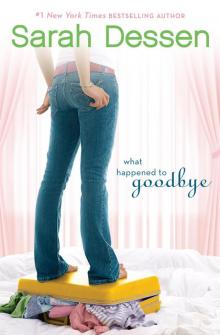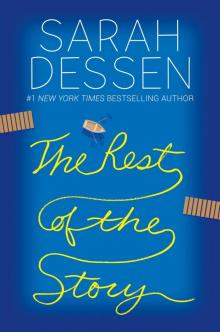- Home
- Sarah Dessen
Someone Like You
Someone Like You Read online
Table of Contents
Title Page
Copyright Page
Part I - THE GRAND CANYON
Chapter One
Chapter Two
Chapter Three
Chapter Four
Part II - SOMEONE LIKE YOU
Chapter Five
Chapter Six
Chapter Seven
Chapter Eight
Chapter Nine
Chapter Ten
Chapter Eleven
Chapter Twelve
Chapter Thirteen
Chapter Fourteen
Chapter Fifteen
Chapter Sixteen
Chapter Seventeen
Part III - GRACE
Chapter Eighteen
Chapter Nineteen
Best friends.
“Scarlett?” I said, there in the dark, and as she turned to me I saw her face was streaked with tears. For a minute, I didn’t know what to do. I thought again of that picture tucked in her mirror, of her and Michael just weeks ago, the water so bright and shiny behind them. And I thought of what she had done all the millions of times I’d cried to her, collapsing at even the slightest wounding of my heart or pride.
So I reached over and pulled her to me, wrapping my arms around her, and held my best friend close, returning so many favors all at once....
NOVELS BY SARAH DESSEN
That Summer
Someone Like You
Keeping the Moon
Dreamland
This Lullaby
The Truth About Forever
I would like to gratefully acknowledge my agent, Leigh Feldman,
and my editor, Sharyn November, for their help, humor, and
determination in seeing this book to publication. Thank you.
SPEAK
Published by Penguin Group
Penguin Group (USA) Inc.,
345 Hudson Street, New York, New York 10014, U.S.A.
Penguin Books Ltd, 80 Strand, London WC2R ORL, England
Penguin Books Australia Ltd, 250 Camberwell Road, Camberwell, Victoria 3124, Australia
Penguin Books Canada Ltd, 10 Alcorn Avenue, Toronto, Ontario, Canada M4V 3B2
Penguin Books (N.Z.) Ltd, 182-190 Wairau Road, Auckland 10, New Zealand
First published in the United States of America by Viking,
a member of Penguin Putnam Inc., 1998
Published by Puffin Books, a division of Penguin Putnam Books for Young Readers, 2000
This edition published by Speak, an imprint of Penguin Group (USA) Inc., 2004
19 20
Text copyright © Sarah Dessen, 1998
All rights reserved
THE LIBRARY OF CONGRESS HAS CATALOGED THE VIKING EDITION AS FOLLOWS:
Dessen, Sarah.
Someone like you / Sarah Dessen.
p. cm.
eISBN : 978-1-101-04228-1
http://us.penguingroup.com
Part I
THE GRAND CANYON
Chapter One
Scarlett Thomas has been my best friend for as long as I can remember. That’s why I knew when she called me at Sisterhood Camp, during the worst week of my life, that something was wrong even before she said it. Just by her voice on the other end of the line. I knew.
“It’s Michael,” she said quietly. Her words crackled over distance. “Michael Sherwood.”
“What about him?” The camp director, a woman named Ruth with short hair and Birkenstocks, shifted impatiently beside me. At Sisterhood Camp, we were supposed to be Isolated from the Pressures of Society in order to Improve Ourselves as Women. We weren’t supposed to get phone calls. Especially not at midnight on a Tuesday, rousing you out of your creaky camp bed and through the woods to a room too bright and a phone that weighed heavily in your hand.
Scarlett sighed. Something was up. “What about him?” I repeated. The camp director rolled her eyes this time, thinking, I was sure, that this was no emergency.
“He’s dead.” Scarlett’s voice was flat, even, as if she were reciting multiplication tables. I could hear clinking and splashing in the background.
“Dead?” I said. The camp director looked up, suddenly concerned, and I turned away. “How?”
“A motorcycle accident. This afternoon. He got hit by a car on Shortcrest.” More splashing, and suddenly I realized she was washing dishes. Scarlett, always capable, would do house-work during a nuclear holocaust.
“He’s dead,” I repeated, and the room seemed very small suddenly, cramped, and as the camp director put her arm around me I shook her off, stepping away. I pictured Scarlett at the sink in cutoffs and a T-shirt, her hair pulled back in a ponytail, phone cocked between her ear and shoulder. “Oh, my God.”
“I know, ” Scarlett said, and there was a great gurgling noise as water whooshed down her sink. She wasn’t crying. “I know.”
We sat there on the line for what seemed like the longest time, the buzzing in the background the only sound. I wanted to crawl through the phone right then, popping out on the other side in her kitchen, beside her. Michael Sherwood, a boy we’d grown up with, a boy one of us had loved. Gone.
“Halley?” she said softly, suddenly.
“Yeah?”
“Can you come home?”
I looked out the window at the dark and the lake beyond, the moon shimmering off of it. It was the end of August, the end of summer. School started in one week; we’d be juniors this year.
“Halley?” she said again, and I knew it was hard for her to even ask. She’d never been the one who needed me.
“Hold on,” I said to her in that bright room, the night it all began. “I’m on my way.”
Michael Alex Sherwood died at 8:55 P.M. on August thirteenth. He was turning left onto Morrisville Avenue from Shortcrest Drive when a businessman in a BMW hit him dead on, knocking him off the motorcycle he’d only had since June and sending him flying twenty feet. The paper said he died on impact, the bike a total loss. It wasn’t his fault. Michael Sherwood was sixteen years old.
He was also the only boy Scarlett had ever truly loved. We’d known him since we were kids, almost as long as we’d known each other. Lakeview, our neighborhood, sprawled across several streets and cul-de-sacs, bracketed only by wooden posts and hand-carved signs, lined in yellow paint: Welcome to Lakeview—A Neighborhood of Friends. One year some high-school students had gone around and crossed out the rs in Friends, leaving us a Neighborhood of Fiends, something my father found absolutely hysterical. It tickled him so much, my mother often wondered aloud if he’d done it himself.
The other distinguishing characteristic of Lakeview was the new airport three miles away, which meant a constant stream of airplanes taking off and landing. My father loved this, too; he spent most evenings out on the back porch, looking up excitedly at the sky as the distant rumblings got louder and louder, closer and closer, until the white nose of a plane would burst out overhead, lights blinking, seeming powerful and loud enough to sweep us all along with it. It drove our neighbor Mr. Kramer to high blood pressure, but my father reveled in it. To me, it was something normal. I hardly stirred, even when I slept, as the glass in my windows shook with the house.
The first time I saw Scarlett was the day she and her mother, Marion, moved in. I was eleven. I was sitting by my window, watching the movers, when I saw a girl just my age, with red hair and blue tennis shoes. She was sitting on the front steps of her new house, watching them cart furniture in, her elbows propped on her knees, chin in her hands, wearing heart-shaped sunglasses with white plastic frames. And she completely ignored me as I came up her front walk, stood in the thrown shade of the awning, and waited for her to say something. I’d never been good at friendships; I was too quiet, too mousy, and tended to c
hoose bossy, mean girls who pushed me around and sent me home crying to my mother. Lakeview, A Neighborhood of Fiends, was full of little fiendettes on pink bicycles with Barbie carrying cases in their white, flower-appliquéd baskets. I’d never had a best friend.
So I walked up to this new girl, her sunglasses sending my own reflection back at me: white T-shirt, blue shorts, scuffed Keds with pink socks. And I waited for her to laugh at me or send me away or maybe just ignore me like all the bigger girls did.
“Scarlett?” a woman’s voice came from inside the screen door, sounding tired and flustered. “What did I do with my checkbook?”
The girl on the steps turned her head. “On the kitchen counter,” she called out in a clear voice. “In the box with the realtor’s stuff.”
“The box with—” The voice came back, uneven, as if its owner was moving around. “—the realtor’s stuff, hmmm, honey I don’t think it’s here. Oh, wait. Yes. Here it is!” The woman sounded triumphant, as if she’d discovered the North-west Passage, which we’d just learned about at the end of the school year.
The girl turned back and looked at me, kind of shaking her head. I remember thinking for the first time how she seemed old for her age, older than me. And I got that familiar fiendette pink-bicycle feeling.
“Hey,” she said to me suddenly, just as I was planning to turn back and head home. “My name’s Scarlett.”
“I’m Halley,” I said, trying to sound as bold as she had. I’d never had a friend with an unusual name; all the girls in my classes were Lisas and Tammys, Carolines and Kimberlys. “I live over there.” I pointed across the street, right to my bedroom window.
She nodded, then picked up her purse and scooted down a bit on the step, brushing it off with her hand and leaving just enough space for someone else about the same size. And then she looked at me and smiled, and I crossed that short expanse of summer grass and sat beside her, facing my house. We didn’t talk right away, but that was okay; we had a whole lifetime of talking ahead of us. I just sat there with her, staring across the street at my house, my garage, my father pushing the mower past the rosebushes. All the things I’d spent my life learning by heart. But now, I had Scarlett. And from that day on, nothing ever looked the same.
The minute I hung up with Scarlett, I called my mother. She was a therapist, an expert on adolescent behavior. But even with her two books, dozens of seminars, and appearances on local talk shows advising parents on how to handle The Difficult Years, my mother hadn’t quite found the solution for dealing with me.
It was 1:15 A.M. when I called.
“Hello?” Strangely, my mother sounded wide awake. It was all part of that professional manner she cultivated: I’m capable. I’m strong. I’m awake.
“Mom?”
“Halley? What’s wrong?” There was some mumbling in the background; my father, rousing himself.
“It’s Michael Sherwood, Mom.”
“Who?”
“He’s dead.”
“Who’s dead?” More mumbling, this time louder. My father saying Who’s dead? Who?
“Michael Sherwood,” I said. “My friend.”
“Oh, goodness.” She sighed, and I heard her telling my father to go back to sleep, her hand cupping the receiver. “Honey, I know, it’s horrible. It’s awfully late—where are you calling from?”
“The camp office,” I said. “I need you to come get me.”
“Get you?” she said. She sounded surprised. “You’ve still got another week, Halley.”
“I know, but I want to come home.”
“Honey, you’re tired, it’s late—” and now she was lapsing into her therapist voice, a change I could recognize after all these years—“why don’t you call me back tomorrow, when you’ve had a chance to calm down. You don’t want to leave camp early.”
“Mom, he’s dead,” I said again. Each time I said the word Ruth, the camp director who was still standing beside me, put on her soothing face.
“I know, sweetie. It’s awful. But coming home isn’t going to change that. It will just disrupt your summer, and there’s no point—”
“I want to come home,” I said, talking over her. “I need to come home. Scarlett called to tell me. She needs me.” My throat was swelling up now, hurting with its ache. She didn’t understand. She never understood.
“Scarlett has her mother, Halley. She’ll be fine. Honey, it’s so late. Are you with someone? Is your counselor there?”
I took a deep breath, and all I could see in my mind was Michael, a boy I hardly knew, whose death now seemed to mean everything. I thought of Scarlett in her bright kitchen, waiting for me. This was crucial.
“Please,” I whispered over the line, hiding my face from Ruth, not wanting this strange woman to feel any sorrier for me. “Please come get me.”
“Halley.” She sounded tired now, almost irritated. “Go to sleep and I’ll call you tomorrow. We can discuss it then.”
“Say you’ll come,” I said, not wanting her to hang up. “Just say you’ll come. He was our friend, Mom.”
She was quiet then, and I could picture her sitting in bed next to the sleeping form of my father, probably in her blue nightgown, the light from Scarlett’s kitchen visible from the window over her shoulder. “Oh, Halley,” she said as if I always caused these kinds of problems; as if my friends died every day. “All right. I’ll come.”
“You will?”
“I just said I would,” she told me, and I knew this would strain us even further, a battle hard-won. “Let me talk to your counselor.”
“Okay.” I looked over at Ruth, who was close to dozing off. “Mom?”
“Yes.”
“Thanks.”
Silence. I would pay for this one for a while, I could tell. “It’s all right. Let me talk to her.”
So I handed the phone over to Ruth, then stood outside the door listening as she reassured my mother that it was fine, I’d be packed and ready, and what a shame, how awful, so young. Then I went back to my cabin, creeping onto my cot in the dark, and closed my eyes.
I couldn’t sleep for a long time. I thought only of Michael Sherwood’s face, the one I’d cast sideways glances at through middle school, the one Scarlett and I had studied in yearbook after yearbook. And later, the one in the picture that was tucked in the mirror in her bedroom, of Scarlett and Michael at the lake just weeks earlier, water glittering behind them. The way her head rested on his shoulder, his hand on her knee. The way he looked at her, and not at the camera, when I pushed the red button, the flash lighting them up in front of me.
My mother didn’t look very happy when she pulled up at the front office the next afternoon. It was clear by this point that my experience at Sisterhood Camp had been a complete and utter disaster. Which was just what I’d predicted when I was dragged off against my will to spend the last two weeks of summer in the middle of the mountains with a bunch of other girls who had no say in the matter either. Sisterhood Camp, which was really called Camp Believe (my father coined the nickname), was something my mother had heard about at one of her seminars. She had come home with a brochure she tucked under my breakfast plate one morning, a yellow sticky note on it saying What do you think? My first reaction was Not much, thank you, as I stared down at the picture of two girls about my age running through a field together hand in hand. The basic gist was this: a camp with the usual swimming and horseback riding and lanyard making, but in the afternoons seminars and self-help groups on “Like Mother, Like Me” and “Peer Pressure: Where Do I Fit In?” There was a whole paragraph on self-esteem and values maintenance and other words I recognized only from the blurbs on the back of my mother’s own books. All I knew was that at fifteen, with my driver’s license less than three months away, I was too old for camp or values maintenance, not to mention lanyards.
“It will be such a valuable experience,” she said to me that evening over dinner. “Much more so than sitting around the pool at Scarlett’s getting a tan and talking about
boys.”
“Mom, it’s summer,” I said. “And anyway it’s almost over. School starts in two weeks.”
“You’ll be back just in time for school,” she said, flipping through the brochure again.
“I have a job,” I told her, my last-ditch attempt at an excuse. Scarlett and I were both cashiers at Milton’s Market, the grocery store at the mall down the street from our neighborhood. “I can’t just take two weeks off.”
“Mr. Averby says it’s slow enough that he can get your shifts covered,” she said simply.
“You called Mr. Averby?” I put down my fork. My father, who up until this point had been eating quietly and staying out of it, shot her a look. Even he knew how uncool it was for your mother to call your boss. “God, Mom.”
“I just wanted to know if it was possible,” she said, more to my father than me, but he just shook his head mildly and kept eating. “I knew she’d think of every reason not to go.”
“Why should I go waste the last two weeks of summer with a bunch of people I don’t know?” I said. “Scarlett and I have plans, Mom. We’re working extra shifts to make money for the beach, and we—”
“Halley.” She was getting irritated now. “Scarlett will be here when you get back. And I don’t ask very much of you, right? This is something I really want you to do. For me, and also, I think you’ll find, for yourself. It’s only for two weeks.”
“I don’t want to go,” I said, looking at my father for some kind of support, but he just smiled at me apologetically and said nothing, helping himself to more bread. He never got involved anymore; his job was to placate, to smooth, once it was all over. My father was always the one who crept to my doorway after I’d been grounded, sneaking me one of his special Brain Freeze Chocolate Milkshakes, which he believed could solve any problem. After the yelling and slamming of doors, after my mother and I stalked to our separate corners, I could always count on hearing the whirring of the blender in the kitchen, and then him appearing at my doorway presenting me with the thickest, coldest milkshake as a peace offering. But all the milkshakes in the world weren’t going to get me out of this.

 Just Listen
Just Listen Along for the Ride
Along for the Ride This Lullaby
This Lullaby Once and for All
Once and for All Lock and Key
Lock and Key The Truth About Forever
The Truth About Forever Someone Like You
Someone Like You What Happened to Goodbye
What Happened to Goodbye Dreamland
Dreamland Keeping the Moon
Keeping the Moon The Rest of the Story
The Rest of the Story The Moon and More
The Moon and More What Happens to Goodbye
What Happens to Goodbye